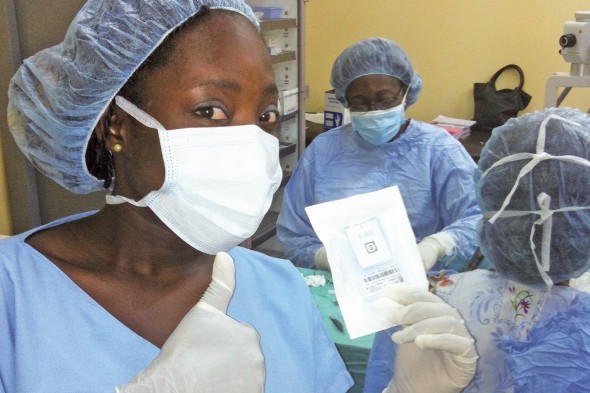Improving vision health in Ghana

“Vision health is paramount to our health in general,” says Mary Otoo, a master’s student in public health who volunteers in Ghana.
Mary Otoo has witnessed what happens when people lose their eyesight and encourages those with good vision to not take it for granted.
“Vision health is paramount to our health in general,” said Otoo, a master’s student in the School of Public Health, who encourages people to check their vision once a year. “So many people wish they could see — even just shadows.”
While volunteering for the Emmanuel Eye Centre in Accra, Ghana, Otoo saw many people in resource-poor areas struggle with vision impairments due to old age, allergies, congenital conditions, environmental factors and physical traumas. “Many in developing countries lose their eyesight at no fault of theirs.”
A substantial amount of that blindness is preventable, said Charlotte Joslin, associate professor in the Department of Ophthalmology and Visual Science and director of contact lens service at the Illinois Eye and Ear Infirmary. Limited access to health care, lack of funds, inadequate vision health professionals are the common challenges to vision heath delivery in Ghana. There are currently only 74 ophthalmologists serving the entire nation. Patients in developing countries like Ghana sometimes develop conditions so severe that they can cause blindness without medical attention.
Otoo recalled removing a patient’s eye patch a day after her cataract surgery at the Emmanuel Eye Center.
“The woman held my wrist tightly, with tears filling her eyes and shaking, and she looked at me intently and said, ‘I could not see you yesterday but today I can. Thank you!’” Otoo said. “It gives me so much joy and happiness to see faces glow with excitement because they can finally see something again.”
Otoo is going back to Ghana this summer as a Unite For Sight Global Impact Fellow to work with partner eye clinics that bring local medical professionals to villages in the country. The volunteer experience is supported by Unite for Sight, a nonprofit organization that provides cost-effective vision care to 1.9 million people. Cataracts, pyterigium and glaucoma are some of the common conditions that volunteers and clinicians treat and teach about to the impoverished populations in Ghana, India and Honduras.
“Mary gets experience in seeing first-hand what the problems are that people in other parts of the world are having,” Joslin said. “This also allows her to recognize the ways in which we can help.”
During her time there, Otoo hopes to survey mothers to investigate maternal perceptions on child eye health, the focus of her independent research study for the School of Public Health.
“There’s a limited period of time during childhood in which vision needs to be improved; otherwise, patients risk permanent poor vision moving forward in life,” said Joslin, who is Otoo’s mentor.
In addition to her volunteer work, Otoo is fundraising $5,000 to provide free vision care and eye restoring surgeries for the impoverished in Ghana, India and Honduras. She has been able to raise about $2,400 and hopes to reach her goal, $5,000, by the end of July. That amount would fully sponsor 100 cataract surgeries.
Donations can be made through July 30.
For more information, email Otoo at motoo3@uic.edu
Categories
Topics
eye care, eye health, Ghana, global health, public health, Unite for Sight, vision, volunteer
